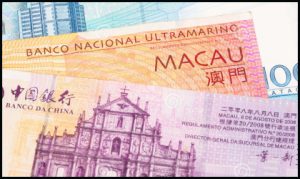The government of Macau has reportedly announced that the city’s 39 casinos handed over almost $76.82 million in aggregated gaming taxes for August to take their combined eight-month reckoning to just above $2.85 billion.
According to a report from Inside Asian Gaming citing official data from the enclave’s Financial Services Bureau, the August figure represents an increase of 52.4% month-on-month despite the enclave chalking up an analogous decline of 94.5% year-on-year in aggregated gross gaming revenues to approximately $166.61 million.
Coronavirus consequences:
Inside Asian Gaming reported that the combined eight-month gaming tax tally is now some 81.6% lower than where it was for the same period last year and means that Macau has so far amassed only about 45.6% of the around $6.26 billion it had earlier predicted for the entirety of 2020. The source detailed that the city of almost 700,000 people had earlier forecast accumulating approximately $12.29 billion in such duties for the entirety of this year but revised this figure down by 49% in May following a slowdown in casino business caused by the coronavirus pandemic.
Encouraging excess:
Despite this significant downturn, GGRAsia used its own  report to explain that Macau’s government still held a budgetary surplus of nearly $2.44 billion through to the end of August, which represents a year-on-year decline of 49%, and has been chalking up increased taxes from ‘other capital revenue’. This source furthermore pronounced that the former Portuguese enclave is nevertheless expecting to record a full-year deficit approaching $4.88 billion despite forecasting that it would collect monthly gaming taxes in the region of $521.12 million between now and the end of December.
report to explain that Macau’s government still held a budgetary surplus of nearly $2.44 billion through to the end of August, which represents a year-on-year decline of 49%, and has been chalking up increased taxes from ‘other capital revenue’. This source furthermore pronounced that the former Portuguese enclave is nevertheless expecting to record a full-year deficit approaching $4.88 billion despite forecasting that it would collect monthly gaming taxes in the region of $521.12 million between now and the end of December.
Significant source:
Macau is home to some of the world’s most iconic casinos including the lotus-shaped Casino Grand Lisboa while GGRAsia reported that these venues are required to pay a 35% gross gaming revenues tax in addition to smaller duties for every live dealer table, gaming machine and VIP room they operate to take the effective rate up to around 39%. These collections purportedly accounted for 75.3% of the city’s most recent eight-month tax haul of almost $3.79 billion, which itself represented a decline of 65% year-on-year.



